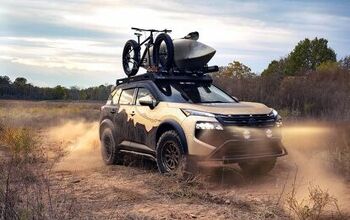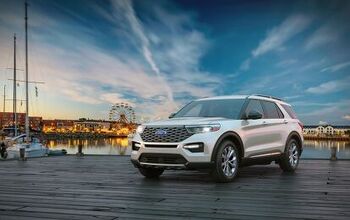QOTD: Do You Care One Bit About Electric Vehicle Speed?

One of the first electric cars I ever drove was also one of the slowest cars I’ve ever piloted. It was a first-generation Nissan Leaf, which on its own was hardly a powerhouse. Certainly, it didn’t go the distance in other ways, as well. Pressing the “eco” button to conserve what limited range I had, the Leaf turned into the biggest slug this side of a Chevette diesel. It was almost dangerously slow.
But it was electric, and the Leaf, at the time, was one of a precious few real EVs any buyer could get their hands on. It’s unlikely those in the market for a non-luxury EV were all that concerned about acceleration back in 2011 or 2012, or whenever it was.
Has anything changed?
The big green news this week was Porsche’s reveal of its slinky Taycan, an EV with no shortage of power and pedigree. Almost instantly, the online crowd began weighing the Taycan’s attributes against those of the Tesla Model S. The Model S is cheaper, can go further on a charge, and it’s maybe a tenth of a second faster to 60 mph than its German rival when placed in Ludicrous Mode.
This author’s reaction? Who fucking cares!
We’re talking the difference between 2.5 and 2.6 seconds to 60 mph. Yes, bragging rights are a big part of prestige, but come on. The Tesla fanbase is already the most annoying crop of people to emerge since certain Westerners quit meat and decided not to let anyone forget about it, but this dick-measuring contest is computer-tossed-out-the-window fare.
Good on Tesla for making a faster car. But is it the most desireable of the two? That all depends on the buyer’s mindset.
Were I purchasing an electric car, looks, range, and price would top the list of concerns, and not in that particular order. For the six-figure car crowd, practical concerns might easily take a backseat to the braggadocious elements of said vehicles. Now, Tesla CEO Elon Musk is taking a Model S to the obnoxiously overused Nürburgring to try and beat the Taycan’s 7 minute, 42 second lap time.
Competition breeds better products, so there’s nothing wrong with two automakers jousting in a closed-course arena. We love it when Ford and Chevy rag on each other’s pickups. And yet the Fremont automaker’s stated goal of saving the world via electric propulsion really doesn’t jibe with its boss’s need to one-up electric rivals at the upper range of price and performance. Musk doesn’t want you to buy the years-delayed $35k Model 3 Standard Range; the everyman’s EV was disappeared shortly after its introduction, though it seems the thing’s still on sale.
I digress! When it comes to electric vehicles, it would seem that longer range is the thing most buyers want. Chevrolet and Hyundai realize this. Providing longer range for an affordable price is what’s going to save the world, at least for those who subscribe to that view of battery-powered vehicles.
Let’s put this to the readers: If you’re thinking about getting into an EV for your next vehicle, where does speed sit on your list of must-haves?
[Image: Porsche]

More by Steph Willems
Latest Car Reviews
Read moreLatest Product Reviews
Read moreRecent Comments
- Fred I would get the Acura RDX, to replace my Honda HR-V. Both it and the CRV seats are uncomfortable on longer trips.
- RHD Now that the negative Nellies have chimed in...A reasonably priced electric car would be a huge hit. There has to be an easy way to plug it in at home, in addition to the obvious relatively trickle charge via an extension cord. Price it under 30K, preferably under 25K, with a 200 mile range and you have a hit on your hands. This would be perfect for a teenager going to high school or a medium-range commuter. Imagine something like a Kia Soul, Ford Ranger, Honda CR-V, Chevy Malibu or even a Civic that costs a small fraction to fuel up compared to gasoline. Imagine not having to pay your wife's Chevron card bill every month (then try to get her off of Starbuck's and mani-pedi habits). One car is not the solution to every case imaginable. But would it be a market success? Abso-friggin-lutely. And TTAC missed today's announcement of the new Mini Aceman, which, unfortunately, will be sold only in China. It's an EV, so it's relevant to this particular article/question.
- Ajla It would. Although if future EVs prove relatively indifferent to prior owner habits that makes me more likely to go used.
- 28-Cars-Later One of the biggest reasons not to purchase an EV that I hear is...that they just all around suck for almost every use case imaginable.
- Theflyersfan A cheaper EV is likely to have a smaller battery (think Mazda MX-30 and Mitsubishi iMEV), so that makes it less useful for some buyers. Personally, my charging can only take place at work or at a four-charger station at the end of my street in a public lot, so that's a crapshoot. If a cheaper EV was able to capture what it seems like a lot of buyers want - sub-40K, 300+ mile range, up to 80% charging in 20-30 minutes (tops) - then they can possibly be added to some lists. But then the issues of depreciation and resale value come into play if someone wants to keep the car for a while. But since this question is asking person by person, if I had room for a second car to be garaged (off of the street), I would consider an EV for a second car and keep my current one as a weekend toy. But I can't do a 50K+ EV as a primary car with my uncertain charging infrastructure by me, road trips, and as a second car, the higher insurance rates and county taxes. Not yet at least. A plug in hybrid however is perfect.


































Comments
Join the conversation
I want to see an electrical vehicle I can actually use. A 4x4 pickup with 2,000 lb cargo ratings and a 500 km range would start to get my interest. Oh and not lose any range in -30C weather.
Absolute speed means less than diddly-squat for me. All things being equal, I would drive an electric car if it matches the capabilities of my Mazda, had decent range (250-300 miles), a reasonable charging time and if it looked decent (looks being subjective obviously). I'm sure a Model 3 would be more than adequate, though I don't know all of its specifics. Also, I'm not sure how electrics do in Minnesota, especially during the winter. They've been too expensive or unavailable for me to really research them. The next logical step for my driving needs would be a hybrid of some sort since I rent and can't necessarily install a charging port. Absolute speed means so little to me that I found my 1.9 litre 1993 Escort to be fine for daily driving in 2005.